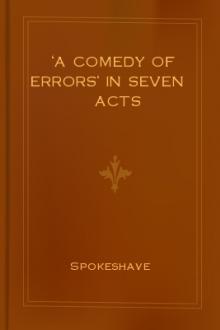Tales of St. Austin's by P. G. Wodehouse (debian ebook reader TXT) 📗

- Author: P. G. Wodehouse
Book online «Tales of St. Austin's by P. G. Wodehouse (debian ebook reader TXT) 📗». Author P. G. Wodehouse
'I didn't know,' said Charteris, 'but I'm very glad to hear it. For hist! I have a ger-rudge against the person. Beneath my ban that mystic man shall suffer, coute que coute, Matilda. He sat upon me—publicly, and the resultant blot on my scutcheon can only be wiped out with blood, or broken rules,' he added.
This was true. To listen to Charteris on the subject, one might have thought that he considered the matter rather amusing than otherwise. This, however, was simply due to the fact that he treated everything flippantly in conversation. But, like the parrot, he thought the more. The actual casus belli had been trivial. At least the mere spectator would have considered it trivial. It had happened after this fashion. Charteris was a member of the School corps. The orderly-room of the School corps was in the junior part of the School buildings. Charteris had been to replace his rifle in that shrine of Mars after a mid-day drill, and on coming out into the passage had found himself in the middle of a junior school 'rag' of the conventional type. Somebody's cap had fallen off, and two hastily picked teams were playing football with it (Association rules). Now, Charteris was not a prefect (that, it may be observed in passing, was another source of bitterness in him towards the Powers, for he was fairly high up in the Sixth, and others of his set, Welch, Thomson, and Tony Graham, who were also in the Sixth—the two last below him in form order—had already received their prefects' caps). Not being a prefect, it would have been officious in him to have stopped the game. So he was passing on with what Mr Hurry Bungsho Jabberjee, B.A., would have termed a beaming simper of indescribable suavity, when a member of one of the opposing teams, in effecting a G. O. Smithian dribble, cannoned into him. To preserve his balance—this will probably seem a very thin line of defence, but 'I state but the facts'—he grabbed at the disciple of Smith amidst applause, and at that precise moment a new actor appeared on the scene—the Headmaster. Now, of all the things that lay in his province, the Headmaster most disliked to see a senior 'ragging' with a junior. He had a great idea of the dignity of the senior school, and did all that in him lay to see that it was kept up. The greater number of the juniors with whom the senior was found ragging, the more heinous the offence. Circumstantial evidence was dead against Charteris. To all outward appearances he was one of the players in the impromptu football match. The soft and fascinating beams of the simper, to quote Mr Jabberjee once more, had not yet faded from the act. A well-chosen word or two from the Headmagisterial lips put a premature end to the football match, and Charteris was proceeding on his way when the Headmaster called him. He stopped. The Headmaster was angry. So angry, indeed, that he did what in a more lucid interval he would not have done. He hauled a senior over the coals in the hearing of a number of juniors, one of whom (unidentified) giggled loudly. As Charteris had on previous occasions observed, the Old Man, when he did start to take a person's measure, didn't leave out much. The address was not long, but it covered a great deal of ground. The section of it which chiefly rankled in Charteris's mind, and which had continued to rankle ever since, was that in which the use of the word 'buffoon' had occurred. Everybody who has a gift of humour and (very naturally) enjoys exercising it, hates to be called a buffoon. It was Charteris's one weak spot. Every other abusive epithet in the language slid off him without penetrating or causing him the least discomfort. The word 'buffoon' went home, right up to the hilt. And, to borrow from Mr Jabberjee for positively the very last time, he had observed (mentally): 'Henceforward I will perpetrate heaps of the lowest dregs of vice.' He had, in fact, started a perfect bout of breaking rules, simply because they were rules. The injustice of the thing rankled. No one so dislikes being punished unjustly as the person who might have been punished justly on scores of previous occasions, if he had only been found out. To a certain extent, Charteris ran amok. He broke bounds and did little work, and—he was beginning gradually to find this out—got thoroughly tired of it all. Offended dignity, however, still kept him at it, and much as he would have preferred to have resumed a less feverish type of existence, he did not do so.
'I have a ger-rudge against the man,' he said.
'You are an idiot, really,' said Welch.
'Welch,' said Charteris, by way of explanation to MacArthur, 'is a lad of coarse fibre. He doesn't understand the finer feelings. He can't see that I am doing this simply for the Old Man's good. Spare the rod, spile the choild. Let's go and have a look at Tony when we're changed. He'll be in the sick-room if he's anywhere.'
'All right,' said the Babe, as he went into his study. 'Buck up. I'll toss you for first bath in a second.'
Charteris walked on with Welch to their sanctum.
'You know,' said Welch seriously, stooping to unlace his boots, 'rotting apart, you really are a most awful ass. I wish I could get you to see it.'
'Never you mind, ducky,' said Charteris, 'I'm all right. I'll look after myself.'
Chapter 2
It was about a week after the Bargees' match that the rules respecting bounds were made stricter, much to the popular indignation. The penalty for visiting Stapleton without leave was increased from two hundred lines to two extra lessons. The venomous characteristic of extra lesson was that it cut into one's football, for the criminal was turned into a form-room from two till four on half-holidays, and so had to scratch all athletic engagements for the day, unless he chose to go for a solitary run afterwards. In the cricket term the effect of this was not so deadly. It was just possible that you might get an innings somewhere after four o'clock, even if only at the nets. But during the football season—it was now February—to be in extra lesson meant a total loss of everything that makes life endurable, and the School protested (to one another, in the privacy of their studies) with no uncertain voice against this barbarous innovation.
The reason for the change had been simple. At the corner of the High Street at Stapleton was a tobacconist's shop, and Mr Prater, strolling in one evening to renew his stock of Pioneer, was interested to observe P. St H. Harrison, of Merevale's, purchasing a consignment of 'Girl of my Heart' cigarettes (at twopence-halfpenny the packet of twenty, including a coloured picture of Lord Kitchener). Now, Mr Prater was one of the most sportsmanlike of masters. If he had merely met Harrison out of bounds, and it had been possible to have overlooked him, he would have done so. But such a proceeding in the interior of a small shop was impossible. There was nothing to palliate the crime. The tobacconist also kept the wolf from the door, and lured the juvenile population of the neighbourhood to it, by selling various weird brands of sweets, but it was only too obvious that Harrison was not after these. Guilt was in his eye, and the packet of cigarettes in his hand. Also Harrison's House cap was fixed firmly at the back of his head. Mr Prater finished buying his Pioneer, and went out without a word. That night it was announced to Harrison that the Headmaster wished to see him. The Headmaster saw him, though for a certain period of the interview he did not see the Headmaster, having turned his back on him by request. On the following day Stapleton was placed doubly





Comments (0)